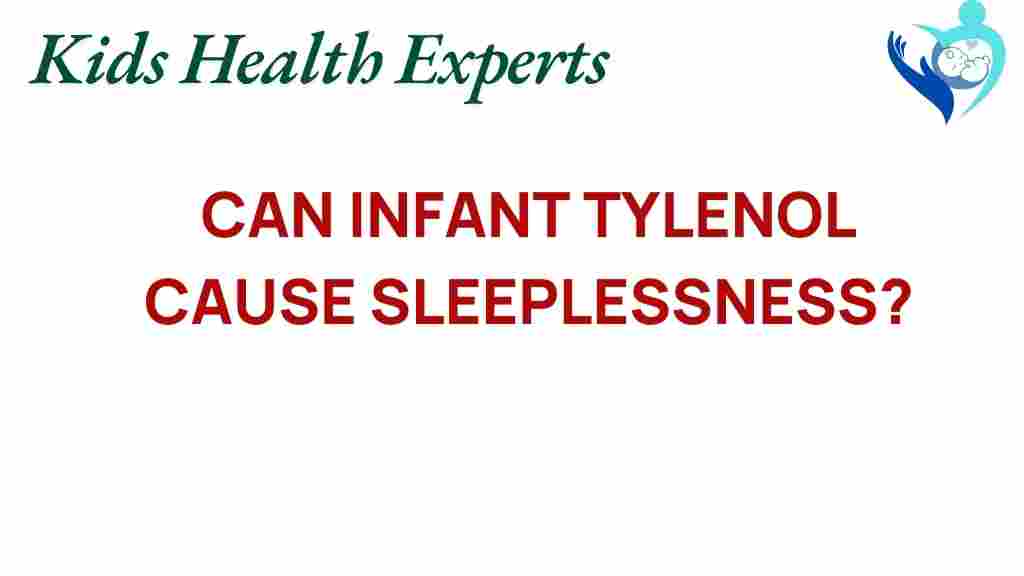Unraveling the Mystery: Can Infant Tylenol Cause Sleeplessness?
As parents, ensuring the health and well-being of our infants is our top priority. When our little ones experience discomfort, it’s not uncommon to turn to medications like Infant Tylenol for relief. However, many parents have raised concerns regarding the potential side effects of this medication, particularly its impact on sleep. In this article, we will delve into the relationship between Infant Tylenol and sleeplessness, exploring the effects of medications, potential sleep disruption, and important considerations for pediatric care.
Understanding Infant Tylenol
Infant Tylenol, also known as acetaminophen, is a commonly used medication for reducing fever and alleviating mild to moderate pain in infants. It is generally considered safe when dosed correctly, but like all medications, it can have side effects.
- Relieves fever
- Alleviates pain
- Available in liquid form for easy administration
The Importance of Pediatric Care
When it comes to infant health, consulting with a pediatrician is crucial. Infants have unique health needs, and what works for adults may not be suitable for them. Always consult your pediatrician before administering any medication, including Infant Tylenol.
How Can Infant Tylenol Lead to Sleeplessness?
While Infant Tylenol is designed to help with pain relief and fever reduction, some parents report that their infants experience sleeplessness after taking the medication. Understanding why this may occur can help parents manage their child’s comfort and sleep better.
Potential Mechanisms of Sleep Disruption
There are several theories regarding how Infant Tylenol might contribute to sleeplessness:
- Stimulation of the Central Nervous System: Acetaminophen can affect neurotransmitter levels, potentially leading to increased alertness in some infants.
- Relief of Discomfort: Once pain or fever subsides, some infants may simply feel more energetic and less inclined to sleep.
- Individual Response: Every infant is unique; some may have sensitivities to medications that can influence their sleep patterns.
Signs of Sleeplessness in Infants
Parents should be aware of the signs that may indicate their infant is experiencing sleeplessness:
- Increased fussiness or irritability
- Difficulty falling asleep or staying asleep
- Frequent waking during the night
- Unusual levels of energy or activity
Step-by-Step: Managing Infant Discomfort and Sleep
To ensure your infant remains comfortable and sleeps well, consider the following steps:
1. Consult Your Pediatrician
Before administering any medication, including Infant Tylenol, always consult your pediatrician. They can provide tailored advice based on your infant’s health history and current condition.
2. Monitor Dosage Carefully
Ensure that you are giving the correct dosage of Infant Tylenol based on your infant’s weight and age. Overdosing can lead to adverse effects, including potential sleep disruption.
3. Observe Your Infant Post-Medication
After giving Infant Tylenol, keep an eye on your infant for any signs of sleeplessness or unusual behavior. This will allow you to assess how they respond to the medication.
4. Create a Calming Bedtime Routine
A consistent and soothing bedtime routine can help signal to your infant that it’s time to sleep. Consider incorporating:
- A warm bath
- Gentle rocking or cuddling
- Soft lullabies or white noise
- Dimmed lights
Troubleshooting Tips for Sleeplessness
If your infant experiences sleeplessness after taking Infant Tylenol, here are some troubleshooting tips to consider:
1. Adjust Timing of Medication
If you notice that your infant is more restless after taking Infant Tylenol, try adjusting the timing of the medication. Administer it closer to bedtime to see if it helps them relax.
2. Explore Alternative Pain Relief Options
Discuss with your pediatrician whether other pain relief options might be more suitable for your infant and less likely to cause sleeplessness.
3. Maintain a Sleep-Conducive Environment
Ensure your infant’s sleeping environment is conducive to rest. This includes:
- Keeping the room dark and quiet
- Maintaining a comfortable temperature
- Using a firm crib mattress and safe bedding
4. Monitor for Other Causes of Sleeplessness
If sleeplessness persists, it may not be related to Infant Tylenol. Consider other factors such as teething, growth spurts, or illness that could be affecting your infant’s sleep.
Conclusion: Safety First in Pediatric Care
While Infant Tylenol is a commonly used medication for managing pain and fever in infants, parents should remain vigilant regarding its potential side effects, including sleeplessness. By understanding how this medication works and monitoring your infant’s response, you can help ensure their comfort and safety.
Always remember that the health and safety of your child is paramount. For more in-depth information on pediatric care and medications, consider reading more from trusted sources such as the American Academy of Pediatrics. If you have ongoing concerns about your infant’s sleep or reaction to medications, consult with your pediatrician for personalized guidance.
For further reading on pediatric care and safety, visit here.
For additional information on medications, check out this resource.
This article is in the category Conditions and created by KidsHealthExperts Team
